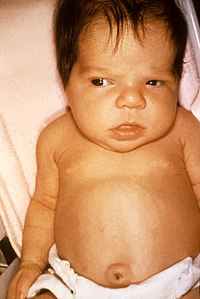
Photo from wikipedia
Background Phenobarbital (PB) has been traditionally used as the first-line treatment for neonatal seizures. More recently, levetiracetam (LEV) has been increasingly used as a promising newer antiepileptic medication for treatment… Click to show full abstract
Background Phenobarbital (PB) has been traditionally used as the first-line treatment for neonatal seizures. More recently, levetiracetam (LEV) has been increasingly used as a promising newer antiepileptic medication for treatment of seizures in neonates. Objectives The aim of our study was to compare the effect of PB vs. LEV on short-term neurodevelopmental outcome in infants treated for neonatal seizures. Method This randomized, one-blind prospective study was conducted on term neonates admitted to the Neonatal Intensive Care Unit of S. Bambino Hospital, University Hospital “Policlinico-Vittorio Emanuele,” Catania, Italy, from February 2016 to February 2018. Thirty term neonates with seizures were randomized to receive PB or LEV; the Hammersmith Neonatal Neurological Examination (HNNE) was used at baseline (T0) and again one month after the initial treatment (T1). Results We found a significantly positive HNNE score for the developmental outcomes, specifically tone and posture, in neonates treated with LEV. There was no significant improvement in the HNNE score at T1 in the neonates treated with PB. Conclusion This study suggests a positive effect of levetiracetam on tone and posture in term newborns treated for neonatal seizures. If future randomized-controlled studies also show better efficacy of LEV in the treatment of neonatal seizures, LEV might potentially be considered as the first-line anticonvulsant in this age group.
Journal Title: Behavioural Neurology
Year Published: 2019
Link to full text (if available)
Share on Social Media: Sign Up to like & get
recommendations!